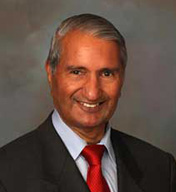 Dr. Khush is from Rurkee; District Jalandhar, Punjab, India. He received a B.Sc. degree from Punjab Agricultural University and a Ph.D. from the University of California, Davis. After serving as a faculty member of the University of California for seven years, he joined International Rice Research Institute (IRRI) in the Philippines as Plant Breeder and was appointed a Head of Plant Breeding Department in 1972. He retired in April 2002 as Principal Plant Breeder and Head of Division of Plant Breeding Genetics and Biochemistry. During his 35 year career at IRRI, he spearheaded the program for developing high yielding and disease and insect resistant varieties of rice which ushered in the green revolution in rice farming. More than 300 rice varieties developed under his leadership have been released in Asia, Africa, and Latin America. IRRI bred varieties or their progenies are now grown on 60 % of the world’s rice land. Rice production increased from 257 million tons in 1966 to 718 million tons in 2011. Most of the major rice-growing countries became self- sufficient in rice production and several have an exportable surplus.
Dr. Khush is from Rurkee; District Jalandhar, Punjab, India. He received a B.Sc. degree from Punjab Agricultural University and a Ph.D. from the University of California, Davis. After serving as a faculty member of the University of California for seven years, he joined International Rice Research Institute (IRRI) in the Philippines as Plant Breeder and was appointed a Head of Plant Breeding Department in 1972. He retired in April 2002 as Principal Plant Breeder and Head of Division of Plant Breeding Genetics and Biochemistry. During his 35 year career at IRRI, he spearheaded the program for developing high yielding and disease and insect resistant varieties of rice which ushered in the green revolution in rice farming. More than 300 rice varieties developed under his leadership have been released in Asia, Africa, and Latin America. IRRI bred varieties or their progenies are now grown on 60 % of the world’s rice land. Rice production increased from 257 million tons in 1966 to 718 million tons in 2011. Most of the major rice-growing countries became self- sufficient in rice production and several have an exportable surplus.
Dr. Cantrell, Director General of IRRI summed up Dr. Khush’s contributions by saying, “while his name may have passed the lips of many, his life’s work passed the lips of almost half the mankind.”
Dr. Khush has made outstanding contributions to advancing the frontiers of rice genetics. He has written 3 books, edited 6 books and has written 250 papers in scientific journals. He has trained numerous plant breeders and served as a consultant to 15 national rice improvement programs.
For his contribution to world food security, Dr. Khush received Japan Prize in 1987, World Food Prize in 1996, Rank Prize in 1998, Wolf Prize in Agriculture in 2000, Padma Shri Award in 2000, Golden sickle Award in 2007 and Mahathir Science Award in 2009. He has received honorary doctorate degrees from twelve universities, including from Cambridge University and Ohio State University. Dr. Khush was elected to the Indian National Science Academy, Indian Academy of Sciences, Russian Academy of Agricultural Sciences, Chinese Academy of Sciences, Third World Academy of Sciences, U.S. National Academy of Sciences and Royal Society of London.
